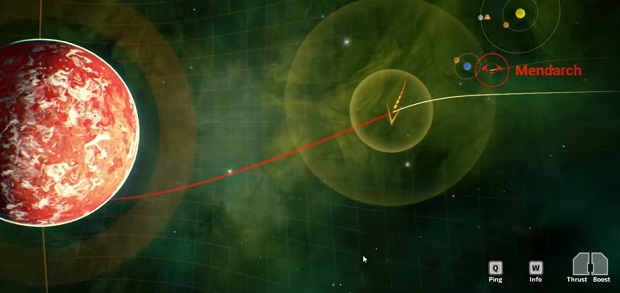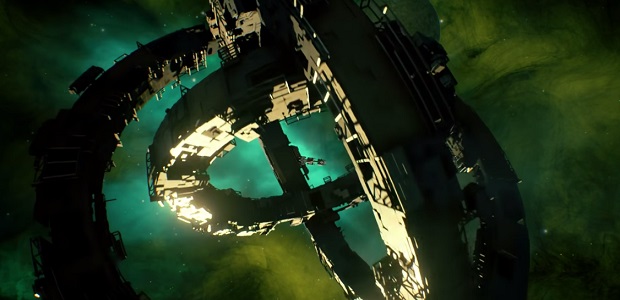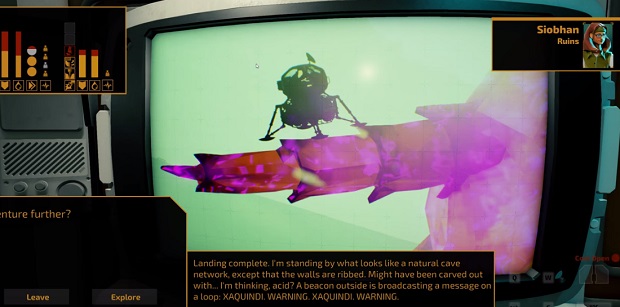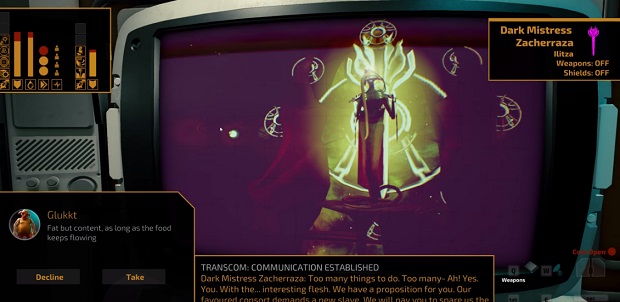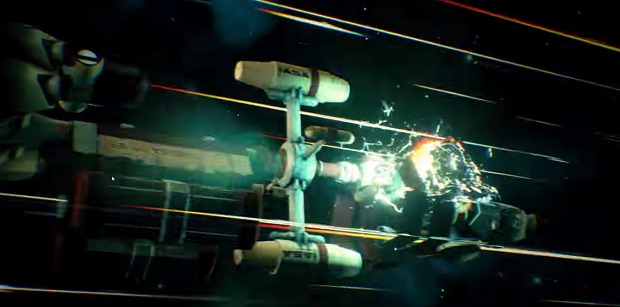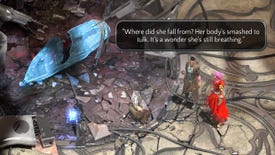Wot I Think: The Long Journey Home
Star Trekkin'
It's not all that long, the journey, but it is very busy. About six hours might do the trick, but you're likely to get distracted along the way. Part Star Trek Voyager and part The Odyssey, The Long Journey Home [official site] puts you in charge of a small crew who have been stranded far from Earth due to a tech malfunction, and must make their way home, making friends and enemies along the way. Though it's clearly inspired by the likes of Star Control and Captain Blood, I've found myself thinking of No Man's Sky as I play. Here's wot I think.
TLJH is one of those games that feels like lots of mini-games stitched together. There's some basic resource management, Thrust-like planetary landings, conversations with alien races, combat, and star system navigation. It's a game that could easily end up being less than the sum of its parts, but the structure of the journey itself ties everything together and makes each decision and challenge important. Whether you're figuring out if a diversion to save a plague-ridden planet is worthwhile or even a realistic possibility given how limited the essential resources needed to keep your ship running might be.
There are four things to consider. Your crew are a primary resource and as they pick up injuries, your journey becomes more perilous. Those injuries come from rough landings, risky flying, certain encounters and ship-to-ship combat. People are your most precious resource, and are irreplaceable, though they can be healed if you find the appropriate items.
The other three resources you'll need to trek across the stars can all be picked up along the way and the core loop of the game involves ensuring you gather enough of each at each stop along the route.
First of all, you'll need fuel to move within systems, and to send your single-seater lander craft down to the surface of planets. It's planetside where you'll find the gases, metals and minerals that are used for refuelling and repair, but you might also want to visit some planets as part of a quest chain, or on the off-chance there'll be some mystery to uncover. But, yes, fuel is of vital importance, and you'll use it to move between planets and find it on planets.
And then there's a second kind of fuel that lets you jump between systems. The ingredients for that are found on planets as well, and you'll always have a fairly good idea what you're going to find once you settle into orbit. A scan tells you what kind of resources to expect, and what quantities they might be found in, and information about inhabitants, atmosphere, weather and overall threat level.
If a planet has firestorms, high winds and scarce supplies, it's probably not worth risking your lander and crew. You can repair both your ship and lander, and that's where the third resource, metal, comes into play.
On one level, that's how The Long Journey Home works; you travel from place to place, gathering enough resources to ensure you can make the next jump, or survive the next tricky landing in order to get the fuel to make the jump. That's where it reminds me of my hours with No Man's Sky, a game in which I never cared for the journey so much as the destination. The lure of discovering new species and biomes was powerful, for a few days, and part of the attraction was knowing that everything I saw mine and mine alone. Discoveries born of code and procedural design.
There is randomisation in The Long Journey Home as well, but it affects the order of things rather than the things themselves. The systems you'll pass through on your way back to our solar system are different each time, but the things within them are hand-crafted. There are several species to encounter, all with their own stories, dialogues and quest chains. Those quests range from delightfully silly interstellar quiz shows and tests of strength to genocide and flirtations with transcendental beings. What they all have in common is a sense of mischievous wit in the writing, which is courtesy of RPS columnist Richard Cobbett, a man who has forgotten more about RPGs and their tropes than most of us have ever known.
The combination of resource-gathering and wordy adventures is an odd one, but it's mostly successful. At worst, the actual business of scooping up fuel and minerals becomes busywork, interrupting the flow of a quest, and the limited number of encounters means that you'll start to see repetition after a few playthroughs. Thankfully, running into aliens you've already met on a previous journey doesn't mean you're in for an identical story – some encounters have fairly predictable outcomes, but some branch and twist, and there are even emergent qualities to some stories, which can be derailed or unexpectedly collide with one another.
There's a lot to like in those encounters but it's hard to escape from the feeling that the actual machinery driving the game is simpler than I'd like it to be. If you come for the stories, you still have to do the work in between them, as if visiting a library with a byzantine membership system that requires you to sign up again every time you want to borrow a book.
Take the lander sections: they're beautiful and simple enough, rarely taking more than five minutes to complete, even if you actually explore the surface and have a mini text adventure rather than just scooping up resources before jetting away. But they're also repetitive and a couple of mistakes can make the cost of landing heavier than rewards. I'd describe The Long Journey Home as a difficult game, given how hard it is to get home, but it's an oddly pitched difficulty. I'm more likely to peter out than to explode in a blaze of glory or perish in a calamitous misadventure.
Simply put, getting home is hard work and even though there are loads of amazing adventures to be had along the way, you'll also be carrying out a lot of maintenance. Think of this more as a warning than a condemnation because I'm still enjoying the game after thirty-five hours of playing. There's something quite soothing about the repetition that puts Long Journey Home into my Podcast Pile – which is to say, the pile of games that I play while listening to podcasts. That's not a bad pile to be in given how many podcasts I listen to every day.
And, yes, it still reminds me of No Man's Sky, but with these discrete mini-games instead of the arduous walking and gathering and crafting and inventory juggling. It also feels like a successor to Digital Eel's Weird Worlds: Return to Infinite Space, and a stronger one than the actual sequel. There's not quite enough here to win me over completely, but there's more than enough to make the numerous trips I've made worthwhile, and part of the charm is in never knowing if there's anything left to discover. The stars are strange and home to many mysteries and it's tempting to stick around until I've seen them all. But keep in mind that there's lots of work to do along the way.
The Long Journey Home is available now for Windows, via Steam and GOG.
Disclosure: Richard Cobbett wrote the words and has a regular column on RPS that I edit most weeks. The fact that I have to look at so many of his words as part of my day-job and actually enjoyed playing a game that was stuffed with even more of them could probably be seen as a compliment.

